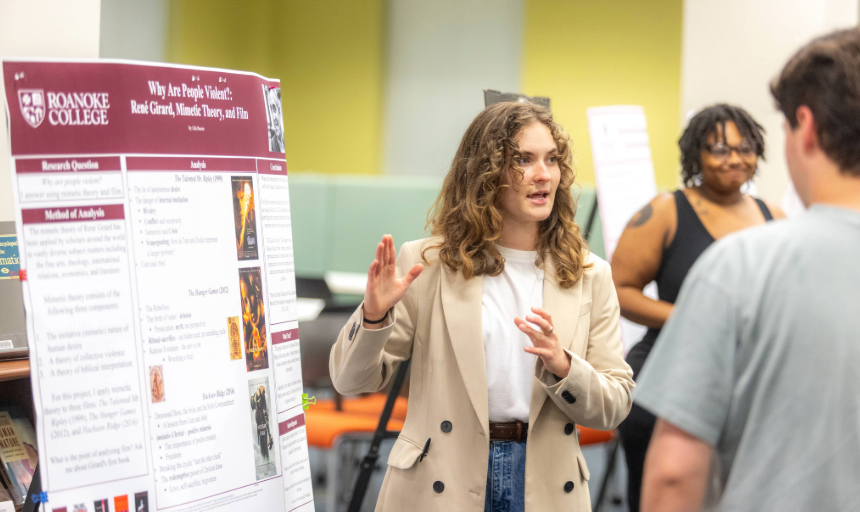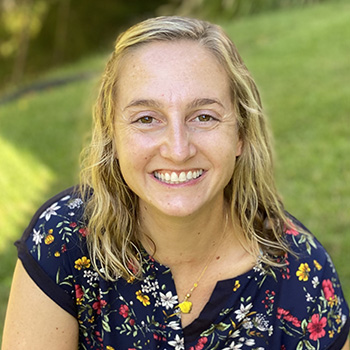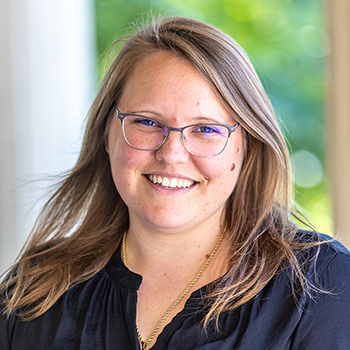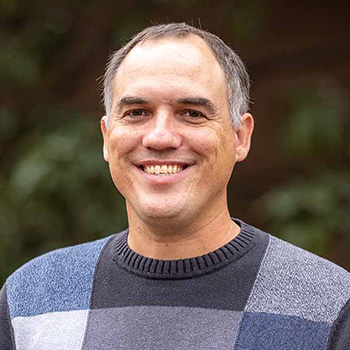Master of Science in Psychology
Roanoke's research-focused program equips you with the advanced skills and expertise needed to thrive in the next phase of your career. Our curriculum explores the core domains of psychology — including developmental, social, cognitive, and physiological psychology — while training you in the essential competencies of quantitative reasoning, research design, data analysis, and more.
From day one, you’ll work with a dedicated thesis mentor and benefit from a professional development plan that includes a research stipend, as well as opportunities to present at conferences and publish your work. This is a two-year, terminal master's degree offered for small cohorts. It emphasizes real-world skill building that prepares you for either a Ph.D. program or the workforce.

Why Choose Roanoke?
-
Real Impact
Engage in original research that culminates in a thesis, with opportunities for community partnerships that bring your work into real-world settings.
-
Faculty Mentors
Develop your skills with personalized, one-on-one support from expert faculty committed to your success from day one.
-
Built-In Benefits
Enjoy a guaranteed stipend for research and travel, plus the opportunity to present at a conference and build fluency in the field's professional standards.
-
Career Ready
Tap into professional development support and training in areas such as networking and scientific communication.
Program Overview
Learning Outcomes
- Disciplinary Knowledge
Students will demonstrate an advanced knowledge of four core psychology content domains, methodology, and quantitative practices. - Scientific Mindedness
Students will formulate evidence-based psychological explanations of phenomena and engage in integrative applications to solve problems. - Ethical and Social Responsibility
Students will behave in accordance with the ethical standards of the discipline and analyze sociocultural factors in the study and practice of psychology. - Communication
Students will produce graduate-level written and oral works that meet disciplinary standards, demonstrate effective interactions with others, and integrate appropriate technology to facilitate effective communication. - Professional Development
Students will identify professional career options, abide by professional workforce and disciplinary standards, enhance professional identity, and exhibit refined project management skills.
Program Highlights
- Collaborative Learning
Our in-person program is built around small cohorts that foster strong, supportive relationships with your professors and peers. - Personalized Mentoring
From the start, you'll be matched with a faculty mentor whose expertise aligns with your goals and interests. - Essential Knowledge
You'll gain a deep understanding of the field — including past and present perspectives — while learning today's most effective research methods. - Career Toolkit
Our focused seminars on professional development will give you the tools and confidence to take the next step forward in your career. - Community Engagement
Research tracks include opportunities for community-based projects working with local organizations that tackle pressing real-world needs. - Research & Travel Funds
Every student is guaranteed a stipend to support research and travel costs.
Courses
The Master of Science in Psychology requires the completion of 11 course units designed to build advanced knowledge and skills within the discipline, including supervised research and a thesis project.
At Roanoke College, one unit is the equivalent of four semester hours. The methods/statistics sequence, applied skills lab, four disciplinary seminar courses, and credits toward the thesis requirement must be taken for a letter grade. Professional development courses (0.25 units each) are taken as a complete/not complete grade each semester.
Students must maintain a cumulative GPA of at least 3.0 across all graded courses and earn no more than one grade of "C" or lower.
Program Requirements:
- Advanced Quantitative and Psychological Methods (I and II): PSYC502 (1 unit) and PSYC504 (1 unit)
- Applied Skills Labs: PSYC503 (0.5 unit) and PSYC505 (0.5 unit)
- Disciplinary Seminars (1 unit each)
- PSYC521 (Advanced Topics in Developmental Psychology)
- PSYC531 (Advanced Topics in Psychophysiology)
- PSYC541 (Advanced Topics in Cognitive Psychology)
- PSYC551 (Advanced Topics in Social Psychology)
- Professional Development (0.25 units each, one taken each semester): PSYC510, PSYC511, PSYC512, AND PSYC513
- Supervised Research and Thesis: Two Supervised Research Courses (PSYC580/582 or PSYC584/586; 0.5 units each) and Two Thesis Study courses (PSYC590/592 or PSYC594/596; 1 unit each, with the thesis defense occurring during 594 or 596)
Course Descriptions
PSYC 502 – Advanced Quantitative and Psychological Methods (I)
This course covers issues related to correlational and experimental research, from developing a research question to communicating results, and processes in-between. We focus on univariate and bivariate cases and their most commonly used statistics. Students demonstrate and apply their knowledge through exams, a research proposal, and preregistration plans.
Units: 1.0
PSYC 503 – Applied Quantitative and Lab Skills (I)
This course introduces practical knowledge and skills used in research, with an emphasis on learning how to conduct statistical analyses using select statistical software tools. Students learn basics of programming, how to use it to conduct operations including data wrangling and visualization, and how to conduct simple statistical analyses.
Units: 0.5
PSYC 504 – Advanced Quantitative and Psychological Methods (II)
This course covers more advanced research methodology and statistical practice, including issues related to correlational and experimental research. We focus on multivariate cases and their most commonly used statistics. Students demonstrate and apply their knowledge through exams, a research proposal, and preregistration plans.
Units: 1.0
PSYC 505 – Applied Quantitative and Lab Skills (II)
This course furthers the development of practical knowledge and skills used in research. Students learn a variety of skills, including advanced survey development techniques and more advanced programming skills, including data transformation and visualization. Students also learn how to conduct more advanced statistical tests using statistical software tools.
Units: 0.5
PSYC 510 – Professional Development in Psychology I
In this course students engage in professional development opportunities to further their professional identities, preparing them for success in the graduate program, discipline, and future careers. The course includes timely content relevant to students’ standing in the program (e.g., networking, application processes, professional communication, management skills, thesis preparation, peer support, and program/disciplinary expectations).
Units: 0.25
PSYC 511 – Professional Development in Psychology II
In this course students engage in professional development opportunities to further their professional identities, preparing them for success in the graduate program, discipline, and future careers. The course includes timely content relevant to students’ standing in the program (e.g., networking, application processes, professional communication, management skills, thesis preparation, peer support, and program/disciplinary expectations).
Units: 0.25
PSYC 512 – Professional Development in Psychology III
In this course students engage in professional development opportunities to further their professional identities, preparing them for success in the graduate program, discipline, and future careers. The course includes timely content relevant to students’ standing in the program (e.g., networking, application processes, professional communication, management skills, thesis preparation, peer support, and program/disciplinary expectations).
Units: 0.25
PSYC 513 – Professional Development in Psychology IV
In this course students engage in professional development opportunities to further their professional identities, preparing them for success in the graduate program, discipline, and future careers. The course includes timely content relevant to students’ standing in the program (e.g., networking, application processes, professional communication, management skills, thesis preparation, peer support, and program/disciplinary expectations).
Units: 0.25
PSYC 521 – Advanced Topics in Developmental Psychology
This course examines growth and change across a variety of developmental domains by overviewing seminal and contemporary research. Topics include in situ aspects of individuals’ development and developmentally-informed interventions. This course is intended to develop knowledge and skills of reading, thinking critically, discussing, and applying developmental psychology research.
Units: 1.0
PSYC 531 – Advanced Topics in Psychophysiology
This course focuses on understanding psychological states/processes by measuring physiological signals. It involves examining seminal and contemporary research and gaining hands-on experience. This class requires active participation and engagement and provides practice in engaging with topics through written and oral presentation and dialogue in class sessions.
Units: 1.0
PSYC 541 – Advanced Topics in Cognitive Psychology
This course examines how the mind works (e.g., learning, memory, perception, attention, decision-making) by overviewing seminal and contemporary research. It involves active participation and engagement, hands-on experience as participant and researcher, and provides practice engaging with topics through written and oral presentation, programming, and dialogue in class sessions.
Units: 1.0
PSYC 551 – Advanced Topics in Social Psychology
This course examines how individuals perceive, judge, remember, reason about, feel, and behave toward other people and among other people by overviewing seminal and contemporary research. This class requires active participation and engagement and will provide practice engaging with topics through written and oral presentation and dialogue in class sessions.
Units: 1.0
PSYC 580 and 582 – Supervised Research
Research students engage in research supervised by a faculty mentor. This experience is intended to develop skills and knowledge related to research in Psychology, and to help work towards the thesis project.
Units: 0.5
PSYC 584 and 586 – Supervised Community Research
Research students engage in research supervised by a professional in the community along with a faculty mentor. This experience is intended to develop skills and knowledge related to research in Psychology, and to help work towards the thesis project.
Units: 0.5
PSYC 590 and 592 – Thesis Study
Students propose, carry out, and defend a thesis project supervised by a faculty mentor. The thesis should be proposed in written and oral form during the semester in which the student is registered for the course. The thesis proposal must be approved by the thesis committee.
Units: 1.0
PSYC 594 and 596 – Community Thesis Study
Students propose, carry out, and defend a thesis project supervised by a professional in the community and a faculty mentor. The thesis should be proposed in written and oral form during the semester in which the student is registered for the course. The thesis proposal must be approved by the thesis committee.
Units: 1.0
Tuition and Fees
Tuition: $2,272.73 per unit, with 6.5 units in year 1 and 3.5 in year 2
Fees: $800 per semester
Admissions
Who Should Apply
Students who are preparing for doctoral studies in psychology or training to further their careers. This is an advanced degree in general psychology that does not directly lead to licensure as a mental health practitioner, but it prepares students to be competitive, well-qualified candidates for a broad range of doctoral programs, including clinical, social and developmental psychology or neuroscience.
Applicants should have:
- A bachelor's degree in psychology or related field.
- A minimum GPA of 2.5 — supplemental statements can be submitted if an applicant does not believe past grades accurately reflect their abilities.
What To Submit
- Transcripts of all college coursework, including graduate work if applicable
- Contact information for two references, including at least one professor
- Personal statement of 500-1200 words that discusses:
- Your areas of interest within psychology
- Your educational and career goals
- Your experiences (academic, professional, and other) that contributed to your skills and development
Applicants will be asked if they prefer to work with a particular faculty member on their master's research and thesis. To learn more about Roanoke College professors, view the faculty tab below.
How To Apply
Applications can be submitted online.
Accreditation
The Master of Science in Psychology is accredited by the Southern Association of Colleges and Schools Commission on Colleges as part of its commitment to meeting rigorous academic standards.
Faculty
Connect with Us
Prospective students are encouraged to contact faculty members they're interested in working with in the program. Graduate program coordinator Dr. Danielle Findley-Van Nostrand also can assist with questions. Email: findley@roanoke.edu.
Events
-
Interested in a unique, experiential learning opportunity inside a local jail? Inside-Out courses (INOUT 299) bring together traditional students and incarcerated students to learn as peers in a local correctional facility.
- Date:
- February 17, 2026
- Time:
- 11:50 a.m. - 12:50 p.m.
- Location:
West Hall 117
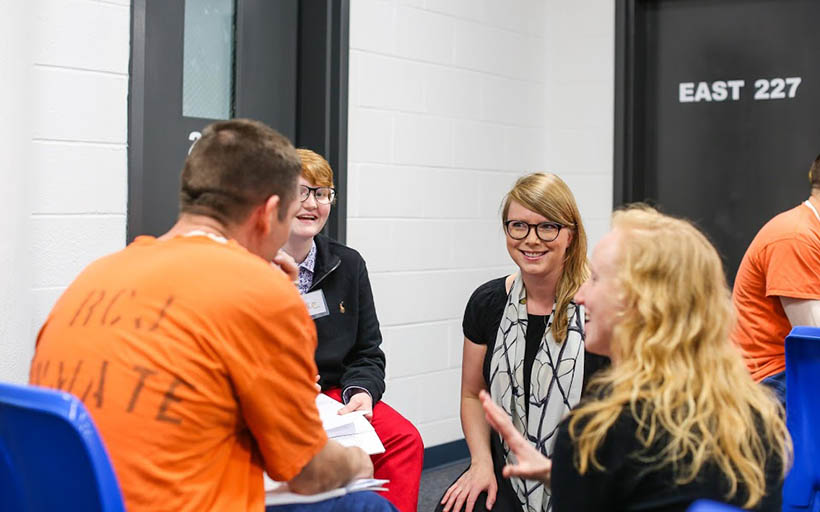
-
This interactive workshop, the first of a two-part event, is intended to train researchers to better communicate their work with people outside of their field. Folks from all programs are encouraged to attend!
- Date:
- March 27, 2026
- Time:
- 4 - 6 p.m.
- Location:
Antrim Chapel
